I guess the last time I left you all, I was about to make my way out of Spain and into the incredible continent of Africa for the first time in my life. I am so excited to share my experience in Morocco with you, but first, here are the pictures from Granada that I promised (with captions!).
Granada
We made visits to the barrios of Sacromonte, Albaicin, and to the Alhambra, which is an enormous and ancient palace that used to house the Moors. We also ate some really great food and made friends with a really nice bartender named Maryann, who worked at a little cafe/restaurant near our Air BnB.
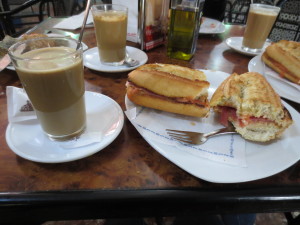
your typical Spanish breakfast: coffee and a bocadillo of Spanish ham, olive oil, and a light tomato spread
Morocco
Granada was absolutely lovely, but what I am about to share with you about Morocco was a completely different kind of experience. It was not what you or I would normally consider a “vacation,” and I’m glad it wasn’t.
There has been a certain comfort in visiting the European highlights; though I didn’t necessarily know places like Portugal, Granada, and Barcelona before visiting them, I at least had an idea of what to expect. I knew that we would be relatively safe traveling on our own; I knew that we could easily navigate public transportation to get where we needed to go; I was aware of the social customs that should govern our behavior while visiting these places. The familiarity was comfortable, or at least comfortable enough so as not to overwhelm my travels.
For Morocco, I immediately felt like that this more or less guaranteed comfort went right out the window. We were told that the ferry from Tarifa (in Spain) to Tangier (in Morocco) might be rough. That we shouldn’t stray too far from the group once we disembarked. That when we walked through the outdoor market in Tangier, there might be bloody animals hanging from the roofs of the vendors’ stands (there were). That we should not drink the tap water or else we would risk getting sick (some did). That we should carry our passports on us at all times, because in many places, we could be stopped and asked for proof of our presence in Morocco. These warnings gave me some fear. It was with shaky legs that I followed our wonderful tour guide, Sarah, off the boat and handed my freshly-stamped passport to the imposing, uniformed guard in Tangier.
CIEE (my study abroad program) decided to conduct our tour of Morocco through an amazing organization called Morocco Exchange. As I said, we were assigned to Sarah, who had been a Peace Corps volunteer for several years and now currently lives in Rabat, the country’s capital. We were lucky to have Sarah as our guide for many reasons, I think especially because she had an awareness of our naivety and of our touristy tendencies as Americans. But she combined this awareness with the experience of living alongside the Moroccan people and the understanding of their customs and behavior. Therefore she was able to acknowledge many of our misconceptions and gently present us with a raw understanding of how things really are in this developing country: that most houses don’t have access to hot water; that many women (girls) are forced to marry at a young age; that the illiteracy rates are high among both men and women; that children often must travel (alone) miles and miles to school on a bus early in the morning in order to attend school, and for this reason many of them drop out.
Sarah shared with us a touching story about her time serving in a small village in the Peace Corps. Her host sister, who was maybe 15 or 16 years old, was about to be married to a much older man. This sister was nervous and upset, and Sarah was trying to comfort her. Sarah classified this as both a high point and a low point of her time in the Peace Corps, and admitted that the memory always made her sad. She started crying as she was telling the story, and I think this was the point when I reflected on how real the experience was and how real the people in Morocco are and always will be, even if in the United States we can’t see or hear them.
We don’t see people sitting on the guardrails of the highways in the countryside, not because they want to go somewhere else but because they don’t have anywhere else to go. We don’t see children walking along deserted roads in the countryside, probably making their way back from school, which could be hours away from home. We don’t see the square miles of shanty towns, the groups of homes made from tin sheets and cardboard, around which often the government often builds walls so other inhabitants of the city don’t have to see the poverty. As is the case for so many of the things we do (or don’t do), it’s easier to construct barriers than to deal with the problem.
I don’t mean to convey that the people of Morocco sit around all day and think about how difficult their lives are, because this was absolutely not the case. In fact, nearly every Moroccan person I met seemed genuinely happy, not only to discuss their own lives but also to compare their life in Morocco to ours in the United States. One of the great things about this program was that, each day, we were able to sit down with a group of Moroccans–two groups of students from Rabat, one family from the rural countryside–and just talk. We talked about what their educational experiences had been like, what their views on homosexuality were, how dating and relationships function. These conversations were many things: they were sometimes heartbreaking, sometimes funny. But all of the time, they were informative and emotionally enriching.
In many ways, we (the members of our American group) were similar to the Moroccan students. We both expressed a yearning for quality education–for one group, it was more accessible than the other. We talked about travel–because so many Moroccans and North Africans seek a better life in Europe, it is much more difficult for them to travel north (ie, obtain a passport) than for us to travel south. Sarah reminded us on our last day that one of the Moroccan students who had accompanied us (and had served as our translator when we talked with the Moroccan family) wouldn’t be able to enter the Spanish enclave of Ceuta (or Sebta) with us because he lacked a “blue book.” Our passports are so much more valuable than we often realize.
I feel like I’m rambling. Let me tell you briefly about some of my favorite things:
- That I was left breathless at the sight of hundreds of Muslims bowing together in prayer
- The flawless hospitality of our host families, who provided us with more food than we possibly could have eaten in the 2 days we spent with them and many of whom offered us a place to stay should we return to Morocco
- Being able to hear the stories of many Moroccans, young and old, and also the stories of Americans who have lived and worked alongside these Moroccans
- How the presence of God (Allah) permeated not only the physical landscape in the form of mosques, but also the social landscape in the form of language (I heard the phrase “Enshallah,” meaning “God willing,” more times than I could count)
I don’t really know what you’re going to take away from this post, disorganized as it is. To be honest, I am still trying to make sense of my experience, though I enjoyed every minute of it. But between the time I returned from my trip and sat on my bed, exhausted and amazed, and now, two weeks later as I am writing this post, I haven’t been able to answer any of the enormous questions that Morocco put in front of me. Why have I been granted such a privileged life while millions of girls (and boys) in Morocco haven’t? Do I have a responsibility to help those who aren’t as privileged? Is there any such thing as “responsibility,” or is it just a way of justifying the process of imposing our own worldviews on others because we believe that our way is the best or only way? How will I ever be able to return to my “normal” life in the United States without that pull in my heart, telling me to remember all that I learned in Morocco?
*
This weekend will be the first that I haven’t traveled since…I think the end of January or the beginning of February. Wow! I am tired but have a good amount of travel still to go. It’s nice to be in Seville this weekend though, and I am slowly realizing that I wish I had stayed here for an entire year just so I could see everything I want to see and still have plenty of time to enjoy the city where I’m actually studying. I was hoping this weekend to have a chance to get to some of the museums but I forgot that the main reason I didn’t plan travel for this weekend was because I have midterms next week. I did, however, sign up for a hike in the Sierra Norte tomorrow, so I’ll be studying the day away today. Look out for another post soon about how things are going here in Seville (preview: they are going really well)!
Location: Rabat, Morocco
Loading map...



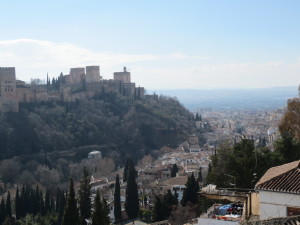

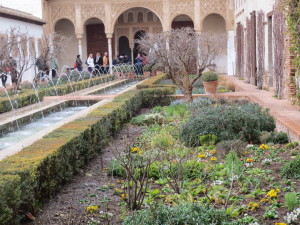
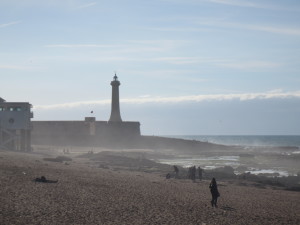
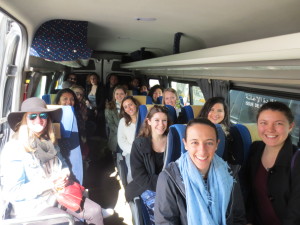
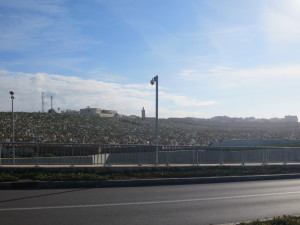
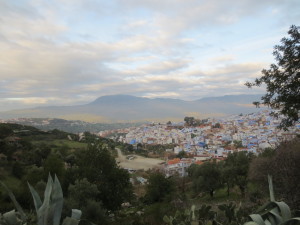
Wow. Your trip to Morocco sounds like it was eye opening. It sounds like a great experience to learn about a life we’re so not used to. I loved where you said “…it’s easier to construct barriers than to deal with the problem” mainly because this is so true. So often do we just try and avoiding what we should be dealing with. I think that it’s awesome that you had to chance to experience this and I can’t wait to hear more about your adventures!